
|
You entered: meteor
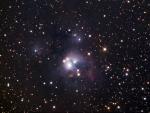 Young Suns of NGC 7129
Young Suns of NGC 7129
11.08.2005
Young suns still lie within dusty NGC 7129, some 3,000 light-years away toward the royal constellation Cepheus. While these stars are at a relatively tender age, only about a million years old, it is likely that our own Sun formed in a similar stellar nursery some five billion years ago.
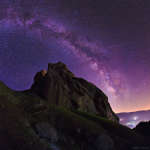 The Starry Night of Alamut
The Starry Night of Alamut
25.06.2010
A meteor's streak and the arc of the Milky Way hang over the imposing mountain fortress of Alamut in this starry scene. Found in the central Alborz Mountains of Iran, Alamut Castle was built into the rock in the 9th century. The name means Eagle's Nest.
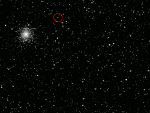 Rosetta s Target Comet
Rosetta s Target Comet
23.05.2014
The Rosetta spacecraft captured this remarkable series of 9 frames between March 27 and May 4, as it closed from 5 million to 2 million kilometers of its target comet. Cruising along...
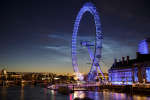 Noctilucent Clouds over London
Noctilucent Clouds over London
10.07.2014
This scene from the early morning hours of July 3 looks out across the River Thames from the Westminster Bridge. Part of a luminous timelapse video (vimeo), the frame captures a sight familiar in London, the nighttime glow of the London Eye.
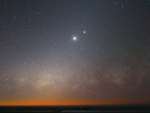 Chilean Skyscape
Chilean Skyscape
28.11.2008
Night skies over Chilean mountain top observatories can be dark and clear, with glorious cosmic vistas. In this recent example, the plane of our Milky Way galaxy stretches parallel to the horizon, the galactic center's star clusters, dark dust clouds, and glowing nebulae hovering in the west.
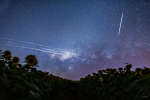 Starlink Satellite Trails over Brazil
Starlink Satellite Trails over Brazil
9.12.2019
What are those streaks over the horizon? New Starlink satellites reflecting sunlight. SpaceX launched 60 Starlink communication satellites in May and 60 more in November. These satellites and thousands more are planned by communications companies in the next few years that may make streaks like these relatively common.
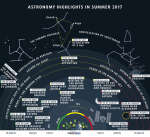 Highlights of the Summer Sky
Highlights of the Summer Sky
4.06.2017
What's up in the sky this summer? The featured graphic gives a few highlights for Earth's northern hemisphere. Viewed as a clock face centered at the bottom, early summer sky events fan out toward the left, while late summer events are projected toward the right.
 A Sonic Boom
A Sonic Boom
20.02.2001
Many people have heard a sonic boom, but few have seen one. When an airplane travels at a speed faster than sound, density waves of sound emitted by the plane cannot precede the plane, and so accumulate in a cone behind the plane.
 The Missing Craters of Asteroid Itokawa
The Missing Craters of Asteroid Itokawa
9.02.2014
Where are the craters on asteroid Itokawa? Missing -- unexpectedly. The Japanese robot probe Hayabusa approached the Earth-crossing asteroid in 2005 and returned pictures showing a surface unlike any other Solar System body yet photographed -- a surface possibly devoid of craters.
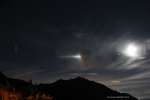 Moondog Night
Moondog Night
10.12.2014
In this night scene from the early hours of November 14, light from a last quarter Moon illuminates clouds above the mountaintop domes of Kitt Peak National Observatory near Tucson, Arizona. Bright Jupiter...
|
January February |
|||||||||||||||||||||||||||||||||||||||||||||||||